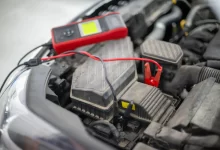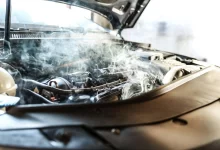Exploring the Effects of Water on Car Batteries: Can Batteries Get Wet and What Happens?
When it comes to car maintenance, one question that often arises is whether car batteries can get wet. After all, cars are regularly exposed to various weather conditions, including rain. It’s natural to wonder how water can affect a crucial component like the battery.
In this article, we will explore the effects of water on car batteries, what happens when a battery gets wet, and how to prevent water damage to your car battery.

Can Car Batteries Get Wet?
Headings
- 1 Can Car Batteries Get Wet?
- 2 What Happens When a Car Battery Gets Wet?
- 3 Preventing Water Damage to Car Batteries
- 4 The Importance of Battery Care
- 5 In Conclusion
- 6 Frequently Asks Questions
- 6.1 Can car batteries get wet?
- 6.2 What happens if water gets into a car battery?
- 6.3 How does water damage a car battery?
- 6.4 Are all car batteries affected by water?
- 6.5 Can I jump-start a car battery if it’s wet?
- 6.6 How do I charge a car battery that got wet?
- 6.7 Can I remove a car battery if it’s wet?
- 6.8 Are there any parts of a car battery that can be damaged by water?
- 6.9 What is the difference between sealed and vented car batteries when it comes to water exposure?
- 6.10 How do I install a car battery if the old one gets wet?
Car batteries, like any other electrical component, are generally not designed to be submerged in water or exposed to excessive moisture.
This means that while car batteries can withstand some exposure to light rain or wet conditions, they should not be directly exposed to large amounts of water or submerged in water. Doing so can lead to water entering the battery and causing damage to its internal components.
The terminals of the car battery, which are the connection points for the electrical system of the vehicle, are particularly vulnerable to water damage.
If water enters the battery terminals, it can cause corrosion and affect the battery’s ability to hold a charge or deliver power to the vehicle.
What Happens When a Car Battery Gets Wet?
When water enters a car battery, it can mix with the battery acid inside the battery case. This can dilute the acid and affect its ability to generate electricity. Furthermore, water can cause corrosion on the battery terminals, preventing a proper connection between the battery and the vehicle’s electrical system.
If a car battery gets wet, it may not function properly. The battery may fail to start the car or may not hold a charge. In some cases, water damage to the battery may even cause the battery to leak or release harmful gases.
Preventing Water Damage to Car Batteries
While car batteries are designed to withstand normal exposure to wet conditions, it is important to take precautions to minimize the risk of water damage. Here are some tips:
1. Keep the Battery Dry
Try to keep your car battery as dry as possible. If you park your car in an area prone to heavy rain, consider covering the battery with a waterproof material. This can help prevent direct exposure to water and reduce the risk of water entering the battery case or terminals.
2. Check the Battery Case
Regularly inspect the battery case for any cracks or damage that could allow water to enter. If you notice any damage, it is important to replace the battery as soon as possible to prevent further water damage and ensure the battery’s proper function.
You may also like this article How Many Wheels Are In The World? to read.
3. Clean the Battery Terminals
Corrosion on the battery terminals can prevent a proper connection and affect the battery’s performance. Regularly clean the battery terminals using a mixture of baking soda and water to remove any corrosion. Ensure that the terminals are dry before reconnecting them to the battery.
4. Avoid Submerging the Battery
Avoid situations where the car battery could be submerged in water, such as driving through flooded areas. If your car does become submerged, it is important to have the battery inspected by a professional to assess any damage and determine if it needs to be replaced.
5. Use Sealed or Vented Batteries
When choosing a car battery, consider opting for sealed or vented batteries. Sealed batteries are designed to prevent water from entering the battery case, while vented batteries have built-in mechanisms to release excess gas and prevent pressure buildup, reducing the risk of water damage.
The Importance of Battery Care
Proper maintenance and care of your car battery are essential to ensure its long life and optimal performance. Regularly check the battery’s charge level, clean the terminals, and inspect the battery case for any signs of damage.
If you suspect any issues with your car battery, such as slow cranking or difficulty starting the vehicle, it is advisable to have it tested by a professional or replace it if necessary.
Remember, a car battery is made up of various components and chemicals that work together to provide electrical power to your vehicle. Understanding how water can affect the battery and taking necessary precautions can help protect your investment and prevent potential damage.
In Conclusion
While car batteries are not designed to be directly exposed to water or submerged, they can withstand light rain or wet conditions. However, excessive water exposure can lead to water entering the battery, causing damage to its internal components and affecting its performance.
To prevent water damage, it is important to keep the battery dry, regularly inspect and clean the terminals, and avoid submerging the battery. By taking these simple precautions, you can ensure the longevity and optimal performance of your car battery.
Frequently Asks Questions
Can car batteries get wet?
Yes, car batteries can get wet if they are exposed to moisture, such as rain or water splashes.
What happens if water gets into a car battery?
If water gets into a car battery, it can cause the electrolyte inside the battery to become diluted. This can lead to the battery malfunctioning or even failing.
How does water damage a car battery?
Water can damage a car battery by altering the concentration of the electrolyte, which affects the battery’s ability to hold a charge and deliver power to the vehicle.
Are all car batteries affected by water?
Yes, all types of car batteries, including sealed and vented batteries, can be affected by water if they get inside the battery.
Can I jump-start a car battery if it’s wet?
It is generally safe to jump-start a wet car battery, but it is important to take precautions and ensure that the battery terminals and surrounding area are dry before attempting to jump-start the vehicle.
How do I charge a car battery that got wet?
If a car battery gets wet, it is recommended to remove the battery from the vehicle and allow it to dry completely before attempting to charge it. Once dry, you can use a car battery charger to recharge the battery.
Can I remove a car battery if it’s wet?
It is safe to remove a wet car battery, but it is important to handle it with care and ensure that the battery terminals and surrounding area are dry to minimize the risk of electrical shock.
Are there any parts of a car battery that can be damaged by water?
Yes, water can damage the battery terminals and the internal components of the battery, leading to corrosion and reduced battery performance.
What is the difference between sealed and vented car batteries when it comes to water exposure?
Sealed car batteries are designed to be maintenance-free and have a sealed case that provides protection against water exposure. Vented car batteries, on the other hand, have vents that allow gases to escape but can also allow water to enter the battery if it is not sealed properly.
How do I install a car battery if the old one gets wet?
If the old car battery gets wet, it is recommended to thoroughly clean the battery compartment and dry it before installing the new battery. Also, make sure to check the terminals and clean them if necessary.



